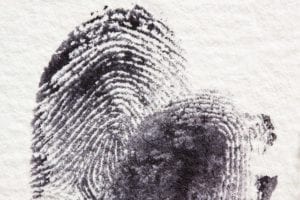
Are fingerprints not actually as conclusive as we have been led to believe?
The use of fingerprints as evidence in court cases is a given for most people these days. After all, each person’s fingerprints are unique, and finding someone’s fingerprints at a crime scene is positive evidence that they were there. Isn’t it? Good question, and many people would probably tell you that the only answer to that is “absolutely!” But according to a recent report by the American Association for the Advancement of Science (AAAS), there may be more to that subject than meets the eye.
The working report reveals that courtroom testimony and reports which state, or even imply, that fingerprints collected from crime scenes are unique to a single person, may lack a solid scientific foundation, and are therefore indefensible. Wait, what’s that, you say? Fingerprints aren’t conclusive evidence of a person’s presence at a crime scene? Well, that’s going to make for an interesting plot twist in the next episode of CSI: Crime Scene Investigation!
Fingerprinting is a critical tool in the toolbox of crime scene investigators hoping to determine who was present when a crime took place. Fingerprints help them identify who was at the scene, what they touched, and even what some of their positions and movements were. Forensic science, which includes the collection and analysis of fingerprints found at crime scenes is critical in helping determine whether or not a defendant is guilty or innocent. That very scenario plays out in Michigan courtrooms every day.
However, as Science Daily points out, many of the forensic “sciences” have been called into question in recent years. Additionally, a 2009 National Research Council report points out that the majority of forensic sciences have not actually been subjected to rigorous scientific study. As a result, it isn’t possible to know specifically which forensic sciences are based on proven scientific study, and which are not. Fingerprints, it seems, may be one of those that could use significantly more study. Arson science has changed drastically in recent years, just as bite mark science was debunked.
So, are fingerprints not as conclusive as we’ve believed for so many years now?
According to Joseph B. Kadane, a Professor of Statistics and Social Sciences at Carnegie Mellon University’s Leonard J. Savage University, they really aren’t. “Our review of the scientific literature found that there is no scientific way to estimate the number of people in some community — a city, a state, the country, the world — who share the characteristics found, and hence no scientific basis for identification.”
Professor Kadane worked with a group of experts in their respective fields while conducting the study. Others included John Black of Black & White Forensics, LLC, William Thompson, of the University of California’s Department of Criminology, Law and Society, and Anil Jain from MSU’s Department of Computer Science and Engineering.
In their seminal work, entitled Forensic Science Assessments: A Quality and Gap Analysis of Latent Fingerprint Analysis, the group explains that although latent fingerprints do rule out the majority of the population, there isn’t enough data to prove that fingerprints truly are unique to each individual. In other words, because the fingerprints of every human alive today haven’t been carefully copied and compared, it isn’t technically true to claim that each person’s fingerprints are unique. Why? Because we shouldn’t extrapolate what we cannot scientifically prove.
So what happens now? In truth, nothing. At least, not for a while. This research isn’t likely to change the way courts and police departments operate. Fingerprints will probably continue to be used as evidence used in solving cases. They will also likely continue to be presented to juries as part of evidence during trials. You may wonder what the point of research like this is, if nothing changes? Well, it’s not that nothing changes. Rather, it’s the fact that change happens slowly, and there is no greater example of gradual change than the justice system.
So with that in mind, we remind our readers that the best way to overcome a trumped up charge is to make sure that you have the best attorney you can afford. Only a highly skilled and experienced defense attorney will know what evidence is questionable, and why. Only an attorney with years of practice will be able to construct a strong defense and fight aggressively for your future in the face of unfounded sciences and groundless data. So if you or a loved one have been charged with a crime in Michigan, call The Kronzek Firm today at 866 766 5245. We are here to protect your rights.







